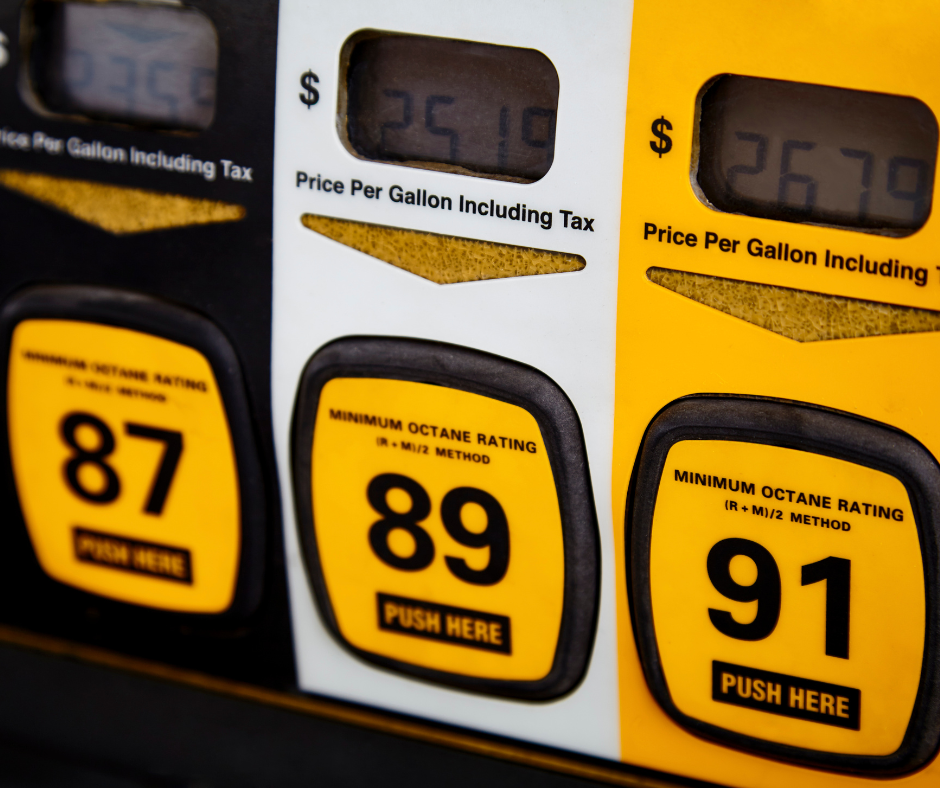Unfortunately, some car owners mistakenly believe that filling their cars with premium gasoline can improve fuel efficiency or boost their vehicle’s miles per gallon. Some cars require premium fuel, while others only need regular fuel.
The difference between these two fuel options goes beyond their price. If you’re unsure which fuel grade is best for your vehicle, this guide might help you save money and keep your engine running optimally.
Premium vs. Regular: What’s the Difference?
The main difference between premium and regular gasoline is their octane rating. Premium gasoline has a higher octane rating, which is why they’re typically recommended for high-performance vehicles. They have a 91 to 94 rating, which allows them to withstand higher engine compressions.

On the other hand, regular gasoline has a lower octane rating, usually around 87. The high octane rating on premium fuel reduces the likelihood of fuel combustion at the wrong time. Usually, this has little to no impact on your car’s engine. However, if it frequently occurs, it can reduce engine performance, decrease fuel efficiency, and cost you money for repairs.
Fuel Price as a Factor
Premium or high octane gasoline is more expensive per gallon than regular gasoline. You may have to pay as much as 70 cents more per gallon to get premium fuel. For some car owners, this price difference can quickly influence their purchasing decisions. However, you should pay attention to other details besides the fuel prices.
Does Premium Gas Last Longer?
With rising pump prices, car owners will want to know which option is more fuel efficient. When you drive into a gas station, you will notice that many of them will offer three different types of fuel:
- Regular gas (87 octane)
- Midgrade gasoline (88 to 90 octane)
- Premium gas (91 and above octane)
It is true that high octane rated gasoline can boost engine performance and improve fuel efficiency. However, that doesn’t necessarily translate to more miles per gallon for your vehicle. If you want better performance from your car’s engine, it is best to use the correct type of gasoline and use fuel conditioners.
Benefits of Using The Right Type of Fuel
How do you know which fuel is best for your vehicle? To find out, check your user’s manual. Your car’s manufacturer will recommend the fuel type that best suits your engine.
Some manuals will specify premium gasoline if the engine performs optimally with that type of fuel. This is true of vehicles with turbochargers and engines with high compression ratios. Doing so will boost your car’s fuel efficiency and performance. However, the majority of cars today perform better using regular gasoline. In addition, using the right type of fuel and fuel additives makes your car run smoothly and helps ensure a clean engine.
When to Use Regular Gasoline
You end up paying good money for something you don’t need if you’re loading your tank with premium, but your car doesn’t require it. According to the Federal Trade Commission (FTC), higher octane fuel provides no benefit for vehicles that don’t need it. It won’t make your car run cleaner or go faster. If your owner’s manual recommends regular gasoline, it’s best to fill the tank with regular fuel.
When to Use Premium Gasoline?
If you’re driving performance vehicles, luxury cars or other car brands with high-compression engines and turbochargers, it is best to use premium gasoline. Using premium fuel reduces vehicle emissions, gets you more miles per gallon and boosts engine performance.
Maintaining a Clean Engine
Keeping your engine clean provides several crucial benefits:
- Prevents rusting
- It reduces the buildup of grease, oil, gunk and dirt.
- Reduces the wear and tear of hoses and plastic components
- Prevents clogging and other minor issues
Regular engine cleaning and using top-of-the-line fuel additives can help to keep your engine clean. Another way to keep it clean is by using fuel with detergent additives, which is actually more important than octane levels. Each gasoline retailer will offer different blends of fuel additives across all fuel types they sell.
They will usually follow the minimum requirements set by the Environmental Protection Agency (EPA). However, car manufacturers such as Audi, Volkswagen, Honda and Toyota have pushed the industry to meet higher standards. Because of this, some retailers offer higher detergent additive concentrations, which is better for your engine. These additives help to clean engine components such as intake valves and injectors.
What If Manufacturers Recommend Premium But Don’t Require It?
In some cases, the owner’s manual will only recommend using premium gas but won’t necessarily require it, which is the case for vehicles like the Mazda MX-5 Miata and Ford F-150. In this case, you can choose either fuel type. However, researchers from the American Automobile Association (AAA) only saw a slight increase in fuel economy and vehicle performance when these vehicles used premium. However, the bottom line is if the benefits outweigh the cost, it’s recommended to use high octane gasoline.
Keep Your Engine Clean and Boost Vehicle Performance
Aside from selecting fuel with the best-suited octane level, your car will benefit from regular engine maintenance using top-grade products. For over 100 years, Berryman Products has consistently provided high-quality, innovative products for the best auto care.
Contact us today to learn more about the products featured here and proper car care, and our specialists will be happy to answer your questions.
